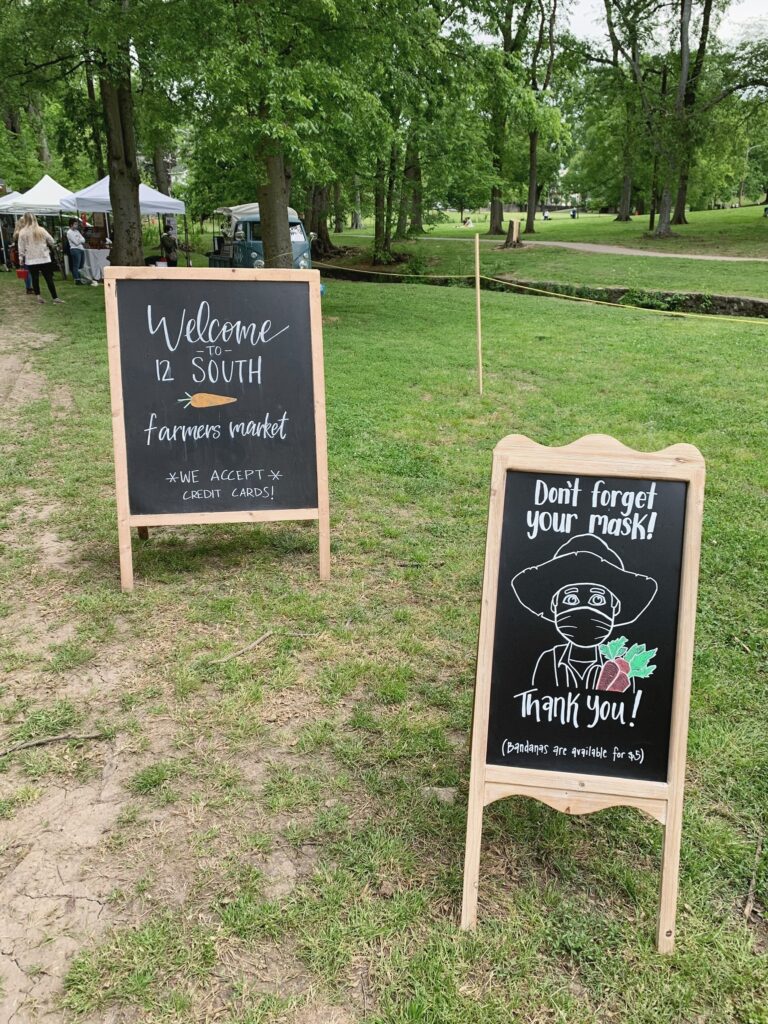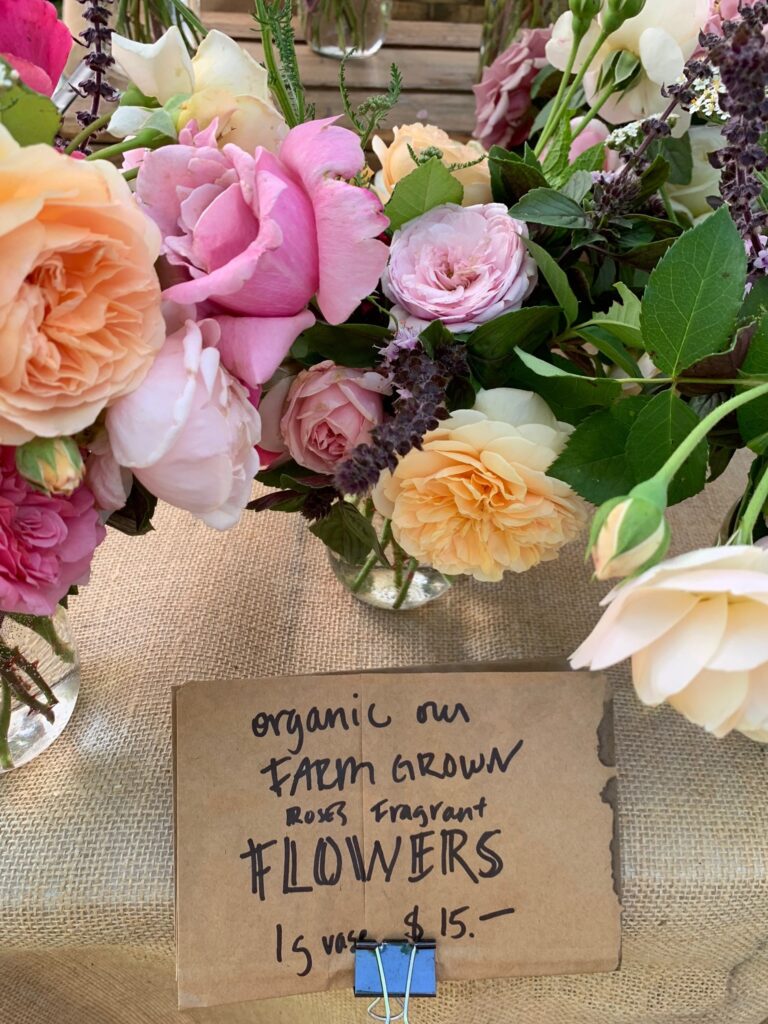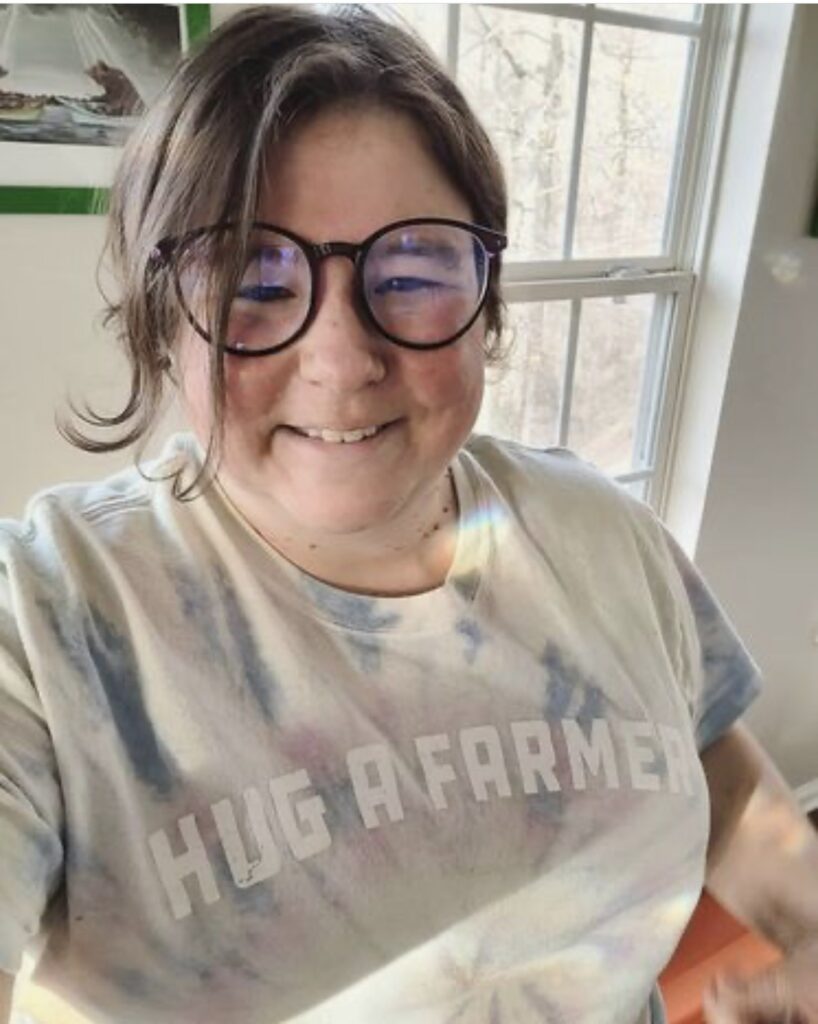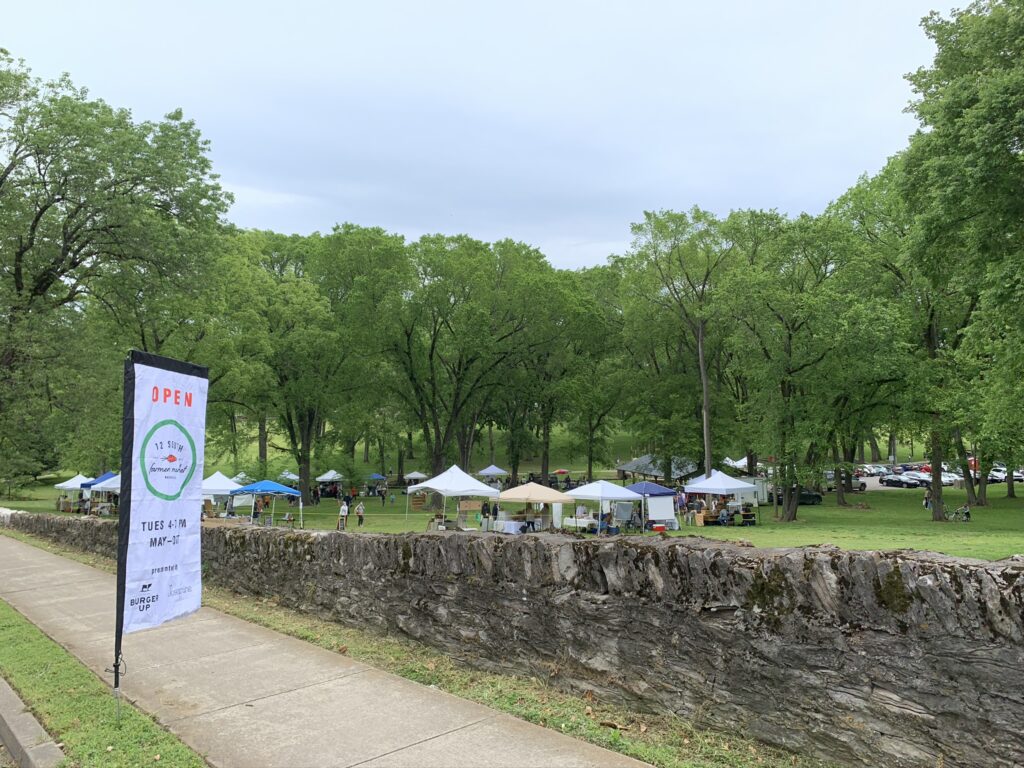Green leaf buds, cherry blossoms and tulips are the beautiful visual cues that spring has arrived. Spring also ushers in the return of farmer’s markets as farmers start sowing seeds and producing produce for markets around the country.
Behind every farmer’s market is a person passionate about, and dedicated to making local food accessible to the community. If you love your local market, you may have wondered how it came to be and who keeps it so organized and reliable. Each manager has their own unique story of how they came to be involved in their market.
Nashville, TN’s 12 South Farmer’s Market is held on a grassy hillside, shaded by the leaves of mature trees in the neighborhood’s Sevier Park. Manager, Dottie Beasley, gives us a peek into her background, how she came to manage this market and what goes into keeping the market up and running.
Dottie’s Background
L.L. What is your background?
D.B. Oddly enough, for most of my adult life, I worked in a field having nothing to do with food – regulatory compliance and security in finance. My near 10 year career in the field started as just a job in my early 20s while I was in college. I kept moving forward and developing, and before I knew it I was 10 years in and on track to move into a regulatory officer position. As I approached my 30s, I knew if I wanted to change career paths and find something I truly loved, there was no time like the present. With a lot of support, encouragement, and pep talks from my husband, I resigned from my position at the time and decided to start from scratch.
L.L. How did you become interested in local food systems?
D.B. When I left the field of finance, my first stop on the path to discovering my passion was photography – something I have loved since childhood and always wanted to explore. This is how I was introduced to the world of farmers markets. In 2011, I connected with Franklin Farmers Market through a family friend. I began volunteering there, photographing the markets as a way to gain experience in event photography.
Spending time at FFM as a volunteer was such a joy for me. I met so many great people and learned so much about the world of farming and local food.
L.L. Did you always envision yourself managing a market?
D.B. Not at all. Sometimes I still don’t believe I get to do this haha! The 12 South Farmers Market is my first baby 🙂
L.L. How did you get involved with the 12 South Market?
D.B. I met the previous owner of 12SFM, Mary Self, through WE (Women Entrepreneurs) Nashville; a kind of support/networking group for female entrepreneurs in Nashville, of which I was a founding member, along with several local food business ladies and friends I had met over the years. In 2015, I started volunteering with 12SFM as a photographer and helping out where I could with other stuff they needed. In 2017, I joined the staff as the Assistant Market Manager. Around this time, it was becoming apparent that professional photography was not in the cards for me. I loved (still do) the art form – but the business of it was not for me. Then in 2018, the market changed ownership; the current owner, Mark Mulch, asked if I wanted to manage the market and of course I was totally in! The rest is history!

Behind the Scenes of the 12 South Market
L.L. What is the history of the 12 South Farmers Market?
D.B. The market was started in 2011 as a small gathering of vendors in Sevier Park. Although I don’t know the exact story behind its inception, I know it has evolved quite a bit over time to become what it is today. What I do know is that the 12 South neighborhood has always embraced the market and there has been a lot of love poured into it throughout the last 10 years!
L.L. What is a typical market day like for a farmers market manager?
D.B. Well, it starts pretty early with lots of coffee! 12SFM is an afternoon market, so our day doesn’t start nearly as early as some of our friends with morning markets like Richland Park, Nolensville, or Franklin. Since we are a Tuesday market, Monday is packed with a lot of administrative work in preparation. Generally, I like to have everything ready to go, so I’m not rushing around on market day. Inevitably though, when you are trying to coordinate so many people, there are things that come up at the last minute. So, typically I check in with emails & texts first thing in the morning, to see if vendors or staff have anything that needs to be addressed before the market. Social media is also a big part of market day, and typically starts in the morning as well – reminding everyone the market is open that day, letting them know what vendors & food trucks will be there, what kind of special activities are happening, etc. I arrive at the park around 11:30AM to block off our parking lot and clear it out for vendor placement and food trucks. Staff members begin to arrive around 12:00PM for us to begin marking off vendor spaces in the field. In 2020, due to COVID-19, we began social distancing vendor tents 6ft apart from each other. So, we take a measuring tape, and with stake flags in the ground, mark each 10ft tent space and corresponding 6ft spaces in between. We do this for about 50 tent spaces, so it can take a while! By 2:00PM, vendors begin to arrive. While the staff begins to unload our equipment for the information booth, music, traffic & parking direction, and any activities going on that day, I direct vendors to their designated spaces. By 3:15PM , I have to make sure all the vendors are in place and get them to move their vehicles to the vendor parking lot across the street. We try to avoid parking too many vendor vehicles on the field itself to avoid tree root damage on the park’s beautiful trees! When the market opens at 4:00PM and customers have already begun arriving! My job for the next couple hours is to answer any questions vendors or customers may have, handle safety or traffic issues, facilitate special activities that don’t have a designated staff person, and of course more social media! Essentially, I need to make sure everyone is taken care of and everything is running smoothly. At 7:00PM the market closes and it’s time to start getting the vendors packed up and ready to go. Typically, by 8:00PM all the vendors and market infrastructure is taken down and it looks like we were never there haha! I’ll spend another 30 minutes to 1 hour on social media reposting from that day’s customers, answering DMs, and I always like to do a “Thank you and good night!” post on market days. Then it’s time to head home and go to bed!
L.L. How do you choose the farms and local businesses who will attend the market?
D.B. First and foremost we prioritize local farms and food vendors with high quality products at our market. If vendors are selling something you can eat, it’s required that they grew it, farmed it, and/or made it – what’s known as a “producer only” criteria in farmers markets. Which vendors are accepted to a farmers market is mostly subjective, depending on the individual market. While we prioritize food, in recent years we have begun allowing other types of vendors that seem to make sense for our mission and customer base. If space is available, we love supporting local social enterprises (something Nashville is lucky to have quite a few of), folks with naturally made & handcrafted beauty products or home goods, local artisans or craftspeople, etc.
L.L. What else can people expect to see and do at the 12 South market, in addition to produce?
D.B. In addition to farm fresh produce, meats, and dairy products – you can also expect to see baked goods, fresh breads, jams & jellies, spice & tea blends, local honey, and coffee. We are also huge supporters of local food trucks and prepared food vendors. In addition to shopping and eating at the market you can also enjoy live music every week, as well as activities like yoga in the park, cooking classes, chef demos, kids arts & crafts, puppy play days, and more!
L.L. How is the market involved with the local community?
D.B. The first year I took over as market manager, I had so many neighborhood families come up to me on opening day and tell me how happy they were that the market was back open – that their kids had been asking when the market was starting again?! Over the years I’ve come to realize that the market has been, and I hope continues to be, a place where the neighborhood and community can come together to be with one another and spend time in the fresh air of our beautiful Metro Nashville Park. We also feel it’s important to support local non-profit organizations doing the work of feeding our neighbors in need and/or those struggling with food insecurity. For this reason we operate a food gleaning program each season. This means shoppers can donate food they’ve purchased at the market, and we will get it to someone who needs it, via a local non-profit organization. I like to refer to it as the “One for you, one for me” program – buy a tomato, give a tomato. That kind of thing. At the end of each market, we also give the farms and vendors an opportunity to donate any unsold products that may go to waste since it was not sold. So, not only does the program help feed those who need it, but also helps cut down on food waste in the community.
L.L. What do you hope people will take away from a market visit?
D.B. Oh this is a big question for me – because there are so many things I hope people take away each week! I suppose first and foremost, I hope they take away some delicious local food and products that improve their lives in some way, brings them happiness, and nourishes their body & soul. I hope they take away the joy of knowing that their food has been produced and made with a lot of care and love.
In a broader sense, I hope they take away the feeling that they are part of something bigger than themselves – that they belong to a community that cares for them, cares for the Earth, and wants to see us all thrive.

General Information About Farmer’s Markets Nationwide
L.L. How do farmers markets get started?
D.B. I suppose each market has a different story, but I imagine they all begin in some way by someone identifying a need in the community. A need for farms and producers to have a place to sell their goods, and a need for the community to have better access to fresh and local food. Some markets are organized by a government entity, like the Nashville Farmers Market which is run by Metro Nashville. And some, like ours, are community markets organized by individuals or organizations.
L.L. If someone wants to organize a market in their area, how would they do so?
D.B. If I were going to organize a market from scratch, I might start by going to my local Parks & Recreation department, Chamber of Commerce, or neighborhood association if there is one. Sometimes, especially in smaller towns, there might already be a market organized, but that just doesn’t have someone to operate it. Once you figure out where you want to have your market, you can go from there. I would also suggest reaching out to market managers of other local markets to get insight and advice. In Nashville and surrounding areas, it’s a community and everyone is really helpful to one another. Another resource in Tennessee is the Tennessee Association of Farmers Markets, a non-profit organization dedicated to the promotion of TN farmers markets and serves as an educational resource for farmers markets and their managers.
L.L. In your view, why should people shop their local farmers market?
D.B. Another question with so many answers! I’d probably start with food quality. Shopping at a local market, you know that your food is fresh and grown safely & sustainably. On average, the time since harvest of something sold at a farmers market is ½ day, where the average time of something at a chain grocery store is 13 days.
At a farmers market, if you have a question about how the food is grown, how to prepare it, it’s nutrition value or taste – anything really – the person to ask is right there in front of you!
Shopping locally also has financial benefits for the community like creating jobs and stimulating the local economy. According to the Farmers Market Coalition, “locally-owned retailers, like farmers markets, return more that 3 times as much of their sales to the local economy compared to chain competitors.” And, growers selling locally create an average of 13 full time jobs per $1MM in revenue earned. Those not selling locally create an average of 3 jobs.
I could probably go on for a while, but I’ll end by saying, it’s fun, the food tastes great, and it just gives you that warm & fuzzy feeling inside haha!
L.L. Can anyone shop at a farmer’s market?
D.B. Yes, all are welcome!
L.L. What can people expect to find at a farmers market?
D.B. What you find at a farmers market will largely depend on where you are and what is local to the area. At a California farmers market for example you might expect to find avocado and citrus fruits – something you won’t see at Tennessee markets. Your finds will also depend on what is in season at the time. For example, in TN, strawberries are usually around for May and June, and maybe early July. After that, they just aren’t in season anymore. I suggest asking your farmer about their growing season and what will be available at different times throughout the year. If you are a CSA (Community Supported Agriculture) share holder, you’ll get a great variety of what’s in season every week. Beyond produce, you can expect to see things all year round like baked goods, eggs, dairy products, jams & jellies, pastas, honey, coffee & tea, and lots more!
L.L. Is shopping at a farmer’s market more expensive than shopping at the grocery store?
D.B. Although it’s a common misconception, shopping at a farmers market on average is not more expensive than shopping at grocery stores – especially if you consider the quality of products and cost per weight.
Also, most markets will advertise on their social media or website if they accept SNAP. If they don’t explicitly state it, I would suggest reaching out to the market manager directly to find out. Also, you can ask your farmer directly if they accept SNAP.
L.L. How should someone go about finding a local market?
D.B. In Tennessee, you can find your local market via Pick TN – which is a part of the Tennessee Department of Agriculture that helps connect the people of TN to local farms and food. Local Table magazine also has a great directory of local farms and markets that they publish, annually I believe. When in doubt, doing a quick online search should do the trick too.

The 12 South Market takes place May to October from 4-7PM in Sevier Park. Keep up to date with the market on Instagram.
Find a local farmer’s market near you using Love Local’s nationwide directory.



